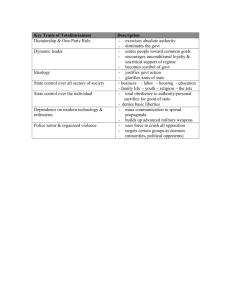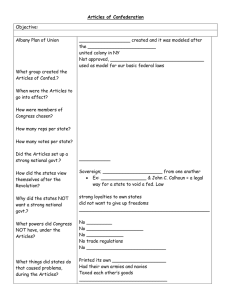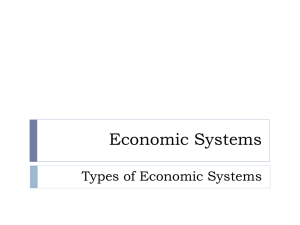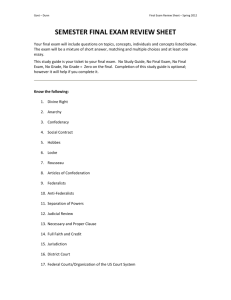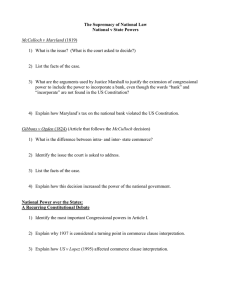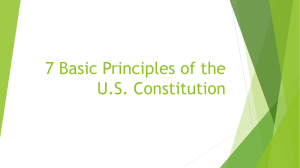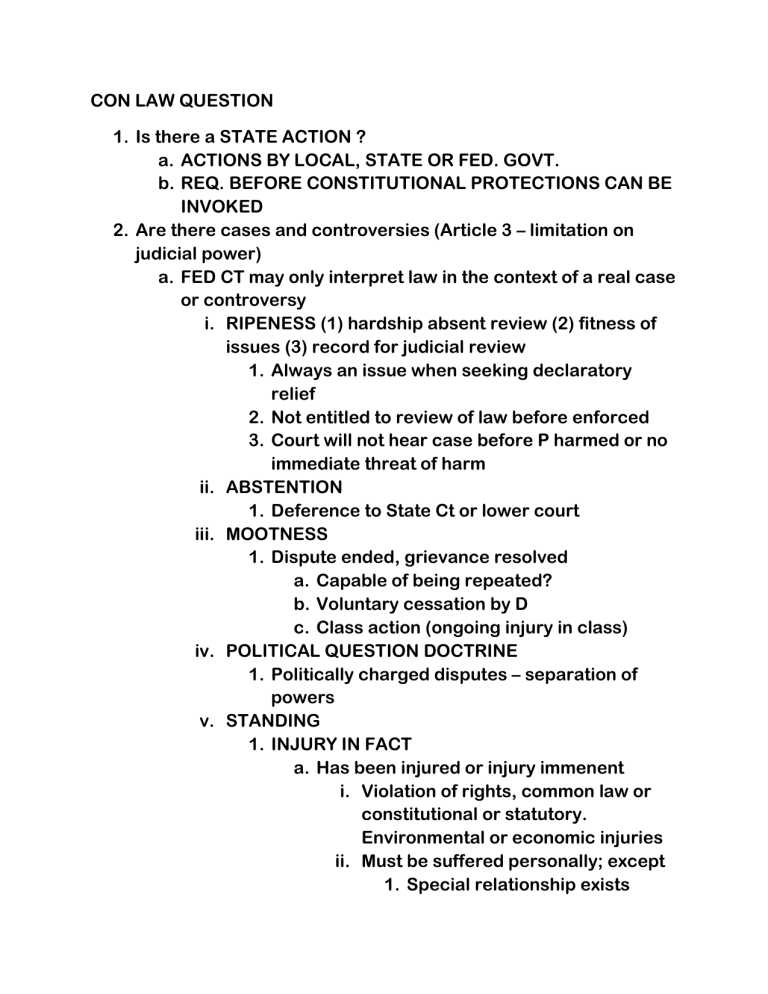
CON LAW QUESTION 1. Is there a STATE ACTION ? a. ACTIONS BY LOCAL, STATE OR FED. GOVT. b. REQ. BEFORE CONSTITUTIONAL PROTECTIONS CAN BE INVOKED 2. Are there cases and controversies (Article 3 – limitation on judicial power) a. FED CT may only interpret law in the context of a real case or controversy i. RIPENESS (1) hardship absent review (2) fitness of issues (3) record for judicial review 1. Always an issue when seeking declaratory relief 2. Not entitled to review of law before enforced 3. Court will not hear case before P harmed or no immediate threat of harm ii. ABSTENTION 1. Deference to State Ct or lower court iii. MOOTNESS 1. Dispute ended, grievance resolved a. Capable of being repeated? b. Voluntary cessation by D c. Class action (ongoing injury in class) iv. POLITICAL QUESTION DOCTRINE 1. Politically charged disputes – separation of powers v. STANDING 1. INJURY IN FACT a. Has been injured or injury immenent i. Violation of rights, common law or constitutional or statutory. Environmental or economic injuries ii. Must be suffered personally; except 1. Special relationship exists a. Dr/Patient b. Seller/Buyer 2. 3rd party unlikely to challenge govt. action a. Crim defendant challenging jury discrimination iii. Organization may sue for members 1. Members could sue 2. Injury related to membership 3. Individual participation not necessary 2. CAUSATION a. Injury traceable to challenged conduct 3. REDRESSABILITY a. Favorable ruling would eliminate or remedy harm 3. DOES GOVT. HAVE POWER TO ACT a. If Government lawmakers trying to regulate another level of government or activities with legislative powers. i. FEDERAL LAW LIMITED BY ENUMERATED POWERS 1. COMMERCE CLAUSE a. Congress may regulate commerce with foreign nations, Indian tribes and among the states. i. Regulate channels of interstate commerce ii. Instrumentalities of IC iii. All activities that have a substantial effect on the US economy b. Interest rates (y) drinking age (n) 2. TAXING AND SPENDING CLAUSE (ART 1) a. MAY TAX AND SPEND FOR GENERAL WELFARE b. CAN IMPOSE CONDITIONS ON USE OF FUNDS 3. NECESSARY & PROPER CLAUSE a. May enact laws all laws necessary and proper to carry out its authority 4. 10th Amendment – Powers not granted to US nor prohibited to the states reserved for the states a. Can induce by putting conditions on grants b. Can prohibit harmful commercial activity ii. STATES PROTECTED BY 1. GENERAL POLICE POWER 2. ANTI-COMANDEERING STATUTE iii. STATES LIMITED BY FEDERALISM 1. Supremacy Clause Article 4 a. Federal law prevails and preempts conflicting state law i. Express preemption – specifically stated ii. Implied preemption – impossible to comply with both laws simultaneously 1. Environmental exception if state law stricter 2. DORMANT COMMERCE CLAUSE a. State law unconstitutional if it places an undue burden on interstate commerce b. If law affects IC but does not discriminate, balancing test used i. Burden on IC vs. benefit to state c. If law burdens and discriminates against out-of-state citizens, violates DCC i. Strike down unless important govt. purpose (HEAVY burden) 3. PRIVILEGES & IMMUNITIES CLAUSE (IV) a. No state may deny citizens of other states p&i it accords it’s own citizens b. May not discriminate against nonresidents c. Must be a citizen to challenge – not a corp d. To defend govt must show cannot achieve objective through non-discriminatory means 4. PRESIDENT ACTING a. Domestic, international & military powers b. Executive powers shared with Congress i. Express or implied auth of congress – authority strong ii. Absence of congressional grant or prohibition – zone of twilight 1. Depends on events, circumstances, contemporary theory of law iii. Against will of congress – power at lowest 4. DOES GOVERNMENT ACTION AFFECT AN INDIVIDUAL RIGHT? a. Levels of Scrutiny i. RATIONAL BASIS TEST – rationally related to legit govt interest 1. Used to review laws affecting economic rights (min wage, trade regs, consumer protection laws) 2. Age, Disability, Wealth, Sexual orientation, Economic classification ii. INTERMEDIATE SCRUTINY – substantially related (narrowly tailored to achieve objective) to an important govt interest 1. GOVT ACTION THAT IMPAIRS PRIVATE PARTIES RIGHTS UNDER AN EXISTING K 2. Discrimination against undocumented alien children 3. Gender classifications 4. Legitimacy classifications – children of unmarried parents 5. Laws applying to speech iii. STRICT SCRUTINY 1. Compelling State Interest – must use least restrictive means possible 2. State law interfering with Govt. K’s 3. Right to Privacy – Marriage, Procreation, Child Custody, Raising Children, Contraceptives? 4. Race, National Origins, Alienage 5. Laws affecting right to travel 6. Laws affecting right to vote 5. IS ONE CLASS OF PERSONS SINGLED OUT? a. EQUAL PROTECTION CLAUSE 14 STATES 5 DPC APPLIED TO FEDERAL i. See classifications for discrimination above 6. INFRINGEMENT UPON A FUNDAMENTAL RIGHT a. DEPRIVING LIFE, LIBERTY OR PROPERTY? THEN MUST PROVIDE PROCEDURAL DUE PROCESS, Balance the: i. Private interest involved ii. Risk of error in existing procedures iii. Governmental interests b. BROADLY AFFECTING EVERYONE’S RIGHT? SUBSTANTIVE DUE PROCESS

